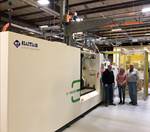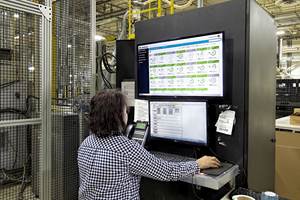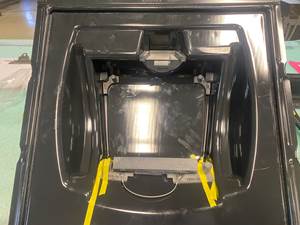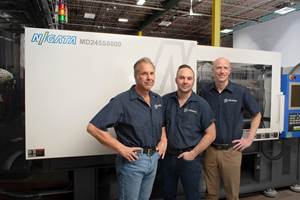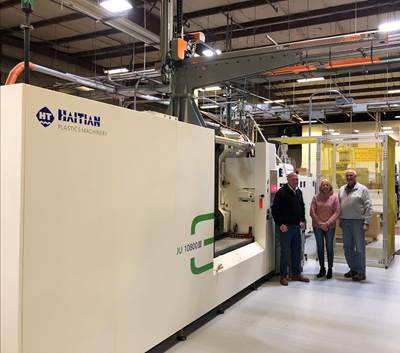Captive Molder Seeks Bigger Footprint in Custom Business
Pittsfield Plastics Engineering has spruced up its facility and added new technology as it seeks to expand its business beyond its proprietary line of reels and spools.
“Man cannot live on reels alone.” Those words, spoken by Thomas Walker, president of Pittsfield Plastics Engineering, LLC (PPE), explains the captive spool and reel molder’s many initiatives over the last few years to bolster the custom side of its business. The most recent of these efforts includes the addition of a 1204-ton injection machine with a shot capacity of 155.6 oz from Absolute Haitian. (see Processor’s Edge, March 2020). But over the last five years, PPE has made a run of enhancements, both cosmetic and technical, to its plant in Pittsfield, Mass., to better position itself as a high-end custom molder.
The company started in 1968 as a mold maker but in short order branched out into injection molded spools and reels. Its founder, David Chiorgno, sold the business in 1997 to Walker and Tom Holmes, chairman and financial advisor. A large percentage of its business is still proprietary spools and reels, says CEO/CFO Bruce Dixon. These come in a wide array of styles and sizes that are sold to the wire, tape, cable, solder, textile, and other industries.
Back in 2009, PPE forayed into the extrusion business, initially seeing it as a way to round out its spool business. It started by making the barrels and film cores for all its reels and spools, then got into the custom profile business for applications that included packaging, wire, tape, film, industrial, home construction, recreation, and avian protection.
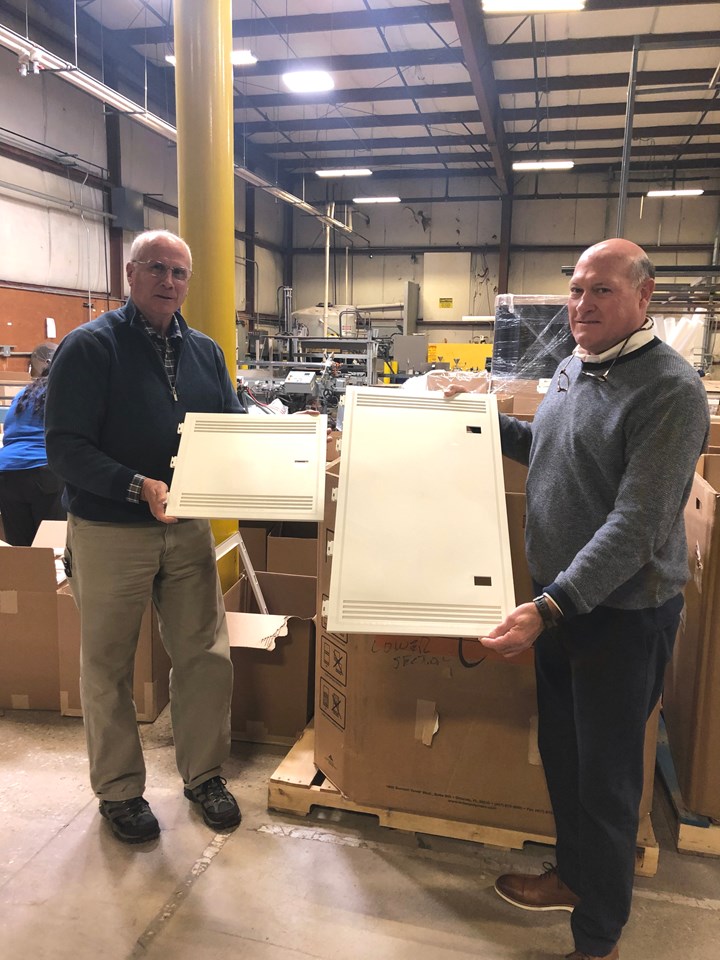
PPE’s CEO Bruce Dixon (right) and Tom Walker, president and co-owner, with small and large electrical enclosures used in commercial real-estate development
But once PPE realized the move to extrusion did not generate the expected results, the firm took steps to modernize its facility, enhance its toolroom, and invest more in quality and R&D by setting up a new Technology Center. PPE upgraded its offices, built a conference room, and added a diamond-polish finish to the floors. “We didn’t want our facility to look like a typical factory,” recalls Walker. “We wanted a clean environment, a professional look. There was one instance where we had a potential customer come in to evaluate our operation from top to bottom and we didn’t get the order. Then, we spruced up our offices, modernized our tool room, added new molding machines, and started up our Technology Center. Once we were done, we invited that customer back in. That was back in 2014. They are still major account of ours today.”
“We didn’t want our facility to look like a typical factory. We wanted a clean environment, a professional look.”
In the toolroom, PPE has recently added a new EDM machine, as well as lathes and milling machines. With its roots in mold making, PPE sought to give itself better tools with which to work. Tooling engineers work with clients from the design phase, defining all critical aspects such as mechanical action, ejection, manifold design, and runner system. Then they work with the customers to develop a specification sheet, which is used as a basis to compare sources. PPE can build molds in-house or source tools from other parts of the world.
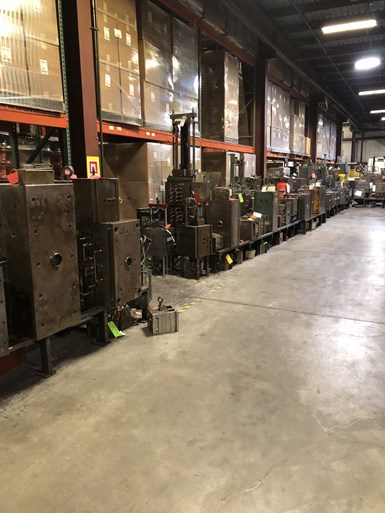
PPE has capacity to store and maintain customer molds.
After the mold vendor is selected in collaboration with their customer, PPE awards the purchase order and begins the process of monitoring the progress of the mold. It will then review and finalize tool acceptance at the mold vendor’s shop. Once accepted, the new mold is crated and shipped to PPE’s production facility. PPE maintains all tools for its customers, ensuring that they are always production-ready and secure.
The new 1204-ton Haitian press brings the number of injection machines in PPE’s 64,000 ft2 plant to 26. Other recent additions include five all-electric Sumitomo Demag presses; and three large hybrid presses from Milacron. To help facilitate the recent energy-efficient machine purchases, PPE has received significant rebates from its electric utility company.
PPE’s Technology Center provides the company with precision measurement capabilities, using a recently acquired Hexagon CMM with direct computer-control (DCC) capability and a Vertex Micro Vu optical inspection device. PPE also conducts material testing with moisture analyzers, melt indexers, PPE’s own design of impact-testing equipment, and a Sintech tensile tester that can reach 20,000 lbs. Also amongst the company’s tool set, are laboratory-grade freezers and ovens, utilized in conditioning safety products for testing product performance against the worst environmental conditions that they may be exposed to.
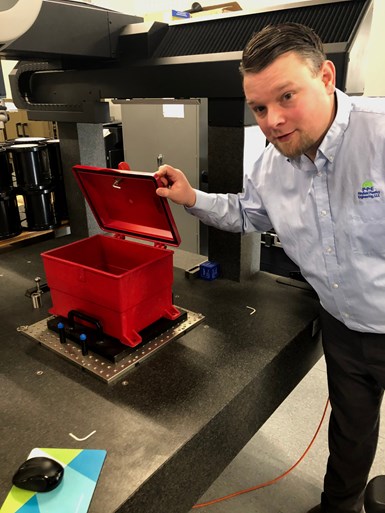
Nick Roth, PPE regional sales manager, in the Technology Center with line of outdoor telephone enclosure boxes used in offshore drilling sites and in baseball bullpens.
Two years ago, PPE added an ERP system from IQMS. On the production floor, each press is now equipped with notepads, so operators may monitor material consumption and scrap rates for every run. Dixon says the software has streamlined PPE’s operations by linking sales, order processing, finance, human resources, operations planning, production scheduling, inventory status, ,material procurement, and more. Adds Walker, “It’s brought us a new level of detail that’s helped everyone who works here.”
All this spiffing up has resulted in the company obtaining new business. Those opportunities include making seats, oars and foot pedals for a kayak manufacturer; electrical enclosures used in commercial real-estate development; and industrial safety helmets in multiple styles and colors.
Related Content
New CRM Streamlines Quoting for Automotive Molder
Eliminating the need to contact each supplier for every individual quote, a new CRM for automotive supplier Axiom Group tracks past quotes as well as industry history to generate fast, reliable RFQs and more.
Read MoreThermoformer Maximizes Productivity with 3D Printing
Productive Plastics has created an extensive collection of 3D printed manufacturing aids that sharply reduce lead times.
Read MoreSecondary Injection Unit Provides Primary Benefits for Molder
Core Technology Molding turned to Mold-Masters E-Multi auxiliary injection unit to help it win a job and dramatically change its process.
Read MoreCustom Injection Molder Plugs into All Electric Machines
Formerly a showroom for early-aughts-era Van Dorn hydraulics, the newest additions to Drummond Industries’ transforming fleet are all-electric Niigata injection molding machines.
Read MoreRead Next
Bigger Press Opens Opportunities for Molder
Acting quickly, Pittsfield Plastics arms its plant with high-tonnage Haitian press to meet customer demand and open options for more large-part molding projects.
Read MoreFor PLASTICS' CEO Seaholm, NPE to Shine Light on Sustainability Successes
With advocacy, communication and sustainability as three main pillars, Seaholm leads a trade association to NPE that ‘is more active today than we have ever been.’
Read More

